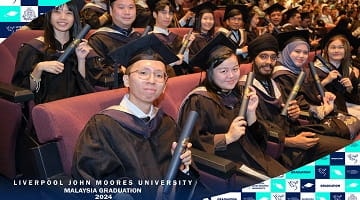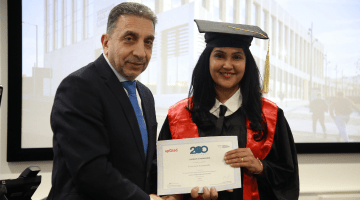About this course
Join this Senior Leader Apprenticeship as part of the Elizabeth Garrett Anderson programme to develop and enhance your existing leadership practice
- Develop and enhance your existing leadership practice through up-to-date theory and evidence.
- Apply learning to bring positive and productive changes to your organisations.
- Strengthen your personal leadership impact to support professional and organisational development.
- Graduate with a highly sought after leadership development qualification, improving your career and promotion prospects
The Elizabeth Garrett Anderson (EGA) Programme is an award-winning leadership development programme designed for middle to senior level leaders responsible for other leaders and aspiring to lead large and complex programmes, departments, services, or systems of care.
The Level 7 Apprenticeship programme is fully funded by the Apprenticeship Levy and leads to a Masters (MSc) in Healthcare Leadership from Liverpool John Moores University, an NHS Leadership Academy Award in Senior Healthcare Leadership, and Chartered Manager Status with the Chartered Management Institute (CMI).
Delivery is designed to support participants to develop together via flexible online learning alongside residentials and tutor support, with a focus on applying your current experience to the study of leadership.
Deadline for applications: 28th February 2025
Course modules
Discover the building blocks of your programme
Further guidance on modules
Modules are designated core or optional in accordance with professional body requirements, as applicable, and LJMU’s Academic Framework Regulations. Whilst you are required to study core modules, optional modules provide you with an element of choice. Their availability may vary and will be subject to meeting minimum student numbers.
Where changes to modules are necessary these will be communicated as appropriate.
Core modules
Senior Leader Apprenticeship - Healthcare Leadership
0 credits
0 credits
This module aims to explore the concept of healthcare leadership through a personal, professional and organisational lens. Learners will be introduced to and draw upon theoretical perspectives to illustrate the complexity of leadership within the health and care sectors. As a result, learners will locate and challenge both personal and professional constructs of leadership and leader development.
Your Learning Experience
An insight into teaching on your course
We adopt an active blended learning approach, meaning you will experience a combination of face-to-face and online learning during your time at LJMU. This enables you to experience a rich and diverse learning experience and engage fully with your studies. Our approach ensures that you can easily access support from your personal tutor, either by meeting them on-campus or via a video call to suit your needs.
Support for students
There is a high level of support for students on this course and the needs of part-time students and degree apprentices are thought through. You will be appointed a Personal Tutor when you are inducted onto the course. They will be responsible for assisting you and providing guidance and care on academic and pastoral matters and also on the development of your Personal Development Plans (PDPs) which form an integral part of your programme and development.
In addition each member of staff has surgery hours which allow you to 'drop in' to discuss academic issues on a one to one basis.
Study hours
Teaching will be a hybrid model, offering self-directed online module delivery alongside residential and face-to-face workshops and tutor support to provide peer learning and the exploration of best practice through comparing experiences and contexts in relation to theory.
Teaching methods
At the centre of our philosophy is the notion that we learn best from experience and applying our learning, so action learning and coaching are a key part of our programmes. This approach also encourages strong peer learning groups where you can learn from your peers, in recognition of the fact that management and leadership development is a social and collaborative process.
The workplace is at the heart of apprenticeship learning. Consequently, everybody brings their experience from their area of expertise with them and you will be encouraged to share how your learning has been applied and improved practice in your workplace. The programme is personalised to individuals so that you can apply your learning to your own workplace projects and tasks.
Learning approaches include:
The workplace as the centre of learning
Apprentices will apply ideas in the workplace, improving their skills through a range of workplace activities and then reflecting and reviewing this practice with peers on the programme. All the assessments are applied and related to the individuals ' own workplace.
Self-development planning
Organisational processes can be applied to ensure that individuals plan to develop in line with apprenticeship standards, with the guidance of your mentors.
A 'flipped learning ' approach
This reverses the conventional process of teaching by providing the content prior to the sessions using a virtual learning environment, so that the focus of the workshop becomes about active learning and application of theory to practice.
We work closely with participants to support their work on real-world projects and gathering evidence for the portfolio. This includes using assignments, work-based project examples and witness testimony to demonstrate the participants healthcare leadership journey. A strong emphasis is placed on the workplace as a place to learn; participants integrate key concepts and theories, assessing the impact of these on their own working environment.
The ability to analyse organisational issues and apply recommendations supported by a theoretical framework is fundamental and is assessed in all elements of the programme.
Action learning
This will be adopted as a supportive and collaborative approach to learning to manage. Action learning will be used to support personal development, where issues and challenges from the workplace can be discussed. This approach to management learning provides a forum to bring ideas, thoughts and issues and allow a collaborative learning process to develop ideas for action.
Work-based assignments
All assignments will relate to the workplace, giving you the opportunity to apply your learning to your organisational context and work towards the level 7 apprenticeship standards.
Masterclasses
Key note speakers address current issues, emerging practice and healthcare leadership. The intent is to foster the need to be continually updating and engaging with the ways in which management in organisation is changing.
How learning is monitored on your programme
To cater for the wide-ranging content of our courses and the varied learning preferences of our students, we offer a range of assessment methods on each programme.
Where you will study
What you can expect from your School
Liverpool Business School is based in the Redmonds Building, in the heart of the bustling Mount Pleasant Campus and Liverpool's growing Knowledge Quarter. The building is home to high quality lecture theatres and seminar rooms, social spaces, and a cafe. It is only a short walk from LJMU's Aldham Robarts Library, which contains all the resources you will require for your studies, and is open seven days a week.
Course tutors

Melissa Holt-Brewster
- Head of Centre
Lisa is currently Head of Centre at Liverpool Business School where she leads a partnership between Liverpool Business School and Liverpool University Hospital NHS Trust with a focus on knowledge exchange and research to inform new ways of working and improved joined up practice within the Liverpool City Region. Prior to this, Lisa was Programme Leader for the MBA and MSc Leadership programmes with extensive experience in the development and delivery of executive education programmes.Lisa’s research interests include the mechanisms through which experiential learning environments can enhance leadership, including pedagogical frameworks which foster leadership development and the development and implementation of systems and place-based leadership within the public sector.
Career paths
Further your career prospects
LJMU has an excellent employability record with 96% (HESA 2018) of our postgraduates in work or further study six months after graduation. Our applied learning techniques and strong industry connections ensure our students are fully prepared for the workplace on graduation and understand how to apply their knowledge in a real world context.
Our applied learning techniques ensure our learners can apply knowledge to real world contexts.
It is expected that Senior Leader Apprentices will use the confidence and skills they have developed on the programme to achieve their aspirations and move more quickly up the career ladder within their organisations.
Another benefit of studying with Liverpool Business School is joining a network of senior professionals. This enables you to continue building meaningful, long-term relationships beyond the classroom, as part of the Liverpool Leadership Network.
Fees and funding
Tuition Fees:
Fees
The fees quoted at the top of this page cover registration, tuition, supervision, assessment and examinations as well as:
- library membership with access to printed, multimedia and digital resources
- access to programme-appropriate software
- library and student IT support
- free on-campus wifi via eduroam
Additional costs
Although not all of the following are compulsory/relevant, you should keep in mind the costs of:
- accommodation and living expenditure
- books (should you wish to have your own copies)
- printing, photocopying and stationery
- PC/laptop (should you prefer to purchase your own for independent study and online learning activities)
- mobile phone/tablet (to access online services)
- field trips (travel and activity costs)
- placements (travel expenses and living costs)
- student visas (international students only)
- study abroad opportunities (travel costs, accommodation, visas and immunisations)
- academic conferences (travel costs)
- professional-body membership
- graduation (gown hire etc)
Funding
There are many ways to fund postgraduate study for home and international students. From loans to International Scholarships and subject-specific funding, you’ll find all of the information you need on our specialist postgraduate funding pages.
Please be aware that the UK’s departure from the EU may affect your tuition fees. Learn more about your fee status and which tuition fees are relevant to you.
Degree Apprenticeships are funded courses, with learning costs being paid to the university by the employer, through the Degree Apprenticeship levy, if a large company, or with the help of the government’s co-investment model, if a smaller company.
If you aren’t already employed by a company that is willing to sponsor you through an apprenticeship, you’ll need to find one. You can do this by regularly checking the Government’s Find an apprenticeship website.
You can also approach an employer yourself to find out whether they would be interested in offering Degree Apprenticeships and ask them to contact us. Our team will be able to explain to them how they can access the correct funding and the next steps.
Information for potential employers
If an employer has a wage bill of over £3 million, it would automatically pay the Government levy and would use this to fund learning via the company Apprenticeship Service Account.
Non- Levy companies can access funding via the Government co-investment model, whereby the Government will fund 95% of the learning costs and the company will fund the remaining 5%.
To access the Government funds, non-levy paying employers are required to set up an account on the Apprenticeship Service and reserve funding for apprentices, no earlier than three months before the course start date. Information regarding setting up an account can be found here. LJMU will still invoice non-levy paying companies for their contribution, but without this account LJMU will be unable to draw down the Government co-investment funding for the apprentices.
Entry requirements
You will need:
Qualification requirements
GCSEs and equivalents
- You will need GCSE Mathematics and English Language (grade A*-C / 9-4) or equivalent.
Further information
-
Extra Requirements
The course team has a strong commitment to widening participation and positively welcomes non-standard applicants. Candidates with some management experience or those who are about to enter a managerial role and have a demonstrated aptitude for study can be accepted without previous experience of higher education.
International requirements
Other international requirements
- Where English is not your first language, or your first degree was not taught and assessed wholly in English, an IELTS score of 6.5 must be achieved, with no individual score of less than 5.5. The programme complies fully with the requirements of the Equality Act 2010.
How to apply
Securing your place at LJMU
To apply for this programme, you are required to complete an LJMU Degree Apprenticeship form. You will need to provide details of previous qualifications and a personal statement outlining why you wish to study this programme.
If you aren’t already employed by a company that is willing to sponsor you through an apprenticeship, you’ll need to find one. You can do this by regularly checking the Government’s Find an apprenticeship website.
You can also approach an employer yourself to find out whether they would be interested in offering Degree Apprenticeships and ask them to contact us. Our team will be able to explain to them how they can access the correct funding and the next steps.
Just like any other job application, you’ll go through a recruitment process with the employer. Check out our interview tips to help you prepare for your Degree Apprenticeship interview. You’ll also need to meet the entry requirements to attend Liverpool John Moores University just like any other student. To do this, find your course and make sure you meet the requirements of the particular course associated with your Degree Apprenticeship.
To apply for a Degree Apprenticeship course complete the online application form.
Once you have applied you are required to complete and return a skills scan document that is automatically sent to you upon receipt of your application. The skills scan enables the programme team to carry out an initial assessment of the knowledge, skills and behaviours (KSBs) that you have acquired through your previous experience and study.
Following consideration of your skills scan, you and your employer contact will be invited to attend a meeting with the Programme Leader to further discuss the requirements of the apprenticeship, including the KSBs set out within the applicable Apprenticeship Standard.
If your application is successful, you’ll enter into an employment/apprenticeship contract with your employer which will set out the obligations of all parties involved in the apprenticeship.
Please upload a CV with your application, detailing your leadership experience.
Your university life
From accommodation and academic support to clubs and societies. Find out what LJMU has to offer.
Talk to our students
Connect with a current LJMU student for advice and guidance on university life, courses and more.
See what our students are saying
At LJMU we want you to know you’re making the right choice by studying with us. You can see what our students are saying about their experience with us through their reviews on the following websites:
Related Links
News and views
Browse through the latest news and stories from the university










The University reserves the right to withdraw or make alterations to a course and facilities if necessary; this may be because such changes are deemed to be beneficial to students, are minor in nature and unlikely to impact negatively upon students or become necessary due to circumstances beyond the control of the University. Where this does happen, the University operates a policy of consultation, advice and support to all enrolled students affected by the proposed change to their course or module.









